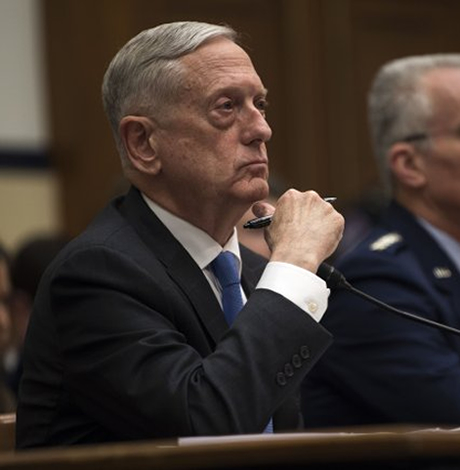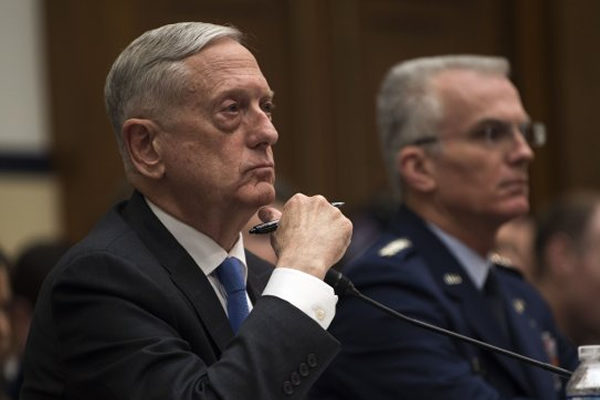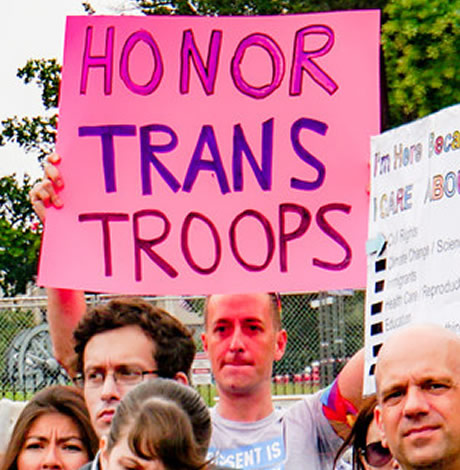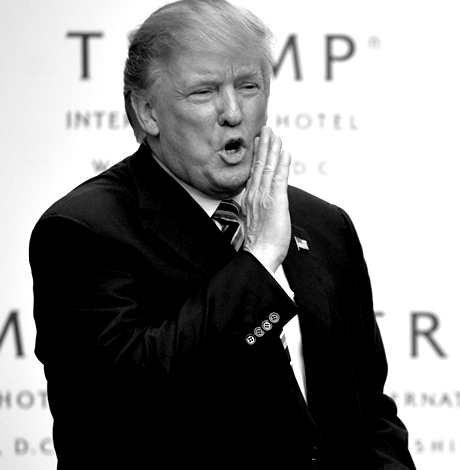News
Mattis claims (dubiously) Joint Chiefs had no input on trans service
Former defense secretary defines anti-trans restrictions he endorsed


Former Defense Secretary James Mattis continues to defend the transgender military ban, making a dubious claim the military service chiefs had no input when openly transgender service was implemented during the Obama years.
Mattis made the remarks in an interview with Time Magazine on the publication of his book, “Call Sign Chaos” in response to a question about why he agreed to roll back policy allowing transgender people to serve in the military.
Although President Trump tweeted he’d ban transgender service members “in any capacity,” Mattis said the new policy was “not a roll back; it was a study.”
Mattis, in apparent reference to the six-month study he was carrying out on transgender service as Trump made the anti-trans tweets, said the policy he proposed “was absolutely a study” based on concerns he said the Joint Chiefs brought up with him.
The military service chiefs, Mattis said, brought up concerns about allowing transgender people into basic training and told him “we’re not ready.”
“I said, ‘What do you mean you’re not ready? Do you have any guidance on what the expectations are? Well, where was your input?’ Mattis said. “They said we didn’t have input.”
It should be noted that when Defense Secretary Ashton Carter announced in 2016 the military would lift the medical regulations banning transgender service and begin its policy of allowing openly transgender people into the armed forces, none of the military service chiefs were present at the news conference.
Mattis said he called for the study on transgender service because he didn’t want to sacrifice the readiness of the armed forces. (Transgender advocates would say the addition of an estimated 14,700 transgender people in the military enhances readiness.)
“I am not going to lose any military efficiency or effectiveness,” Mattis said. “And that’s why I called for a study. And then I just need to leave it there because it’s in courts right now and I shouldn’t be addressing things when I’m no longer privy to the ongoing discussions or where the policy is at.”
Mattis said he was couching his remarks because litigation challenging the transgender military ban remains pending. Although the U.S. Supreme Court essentially issued a green light allowing the Trump administration to implement the ban, the process of litigation continues in lower courts.
The study Mattis conducted resulted in his recommendation to restrict the military service of transgender people in a policy that essentially amounts to a ban. Although transgender people who came out under the Carter policy can remain in the armed forces, transgender people now face significant barriers in enlisting in the armed forces and those who are diagnosed at a later time are now discharged.
Aaron Belkin, director of the San Francisco-based Palm Center, said in a statement Mattis “continues to bury his head in the sand when the health and unity of the nation are at stake,” placing any blame on lack of readiness on the feet of the military service chiefs.
“When it comes to transgender military service, Secretary Mattis asserted falsely that the Service Chiefs had no input into how new transgender recruits would be integrated into basic training,” Belkin said. “In fact, the Chiefs were put in charge of applying transgender policy to the basic training environment, and they were given an entire year to figure it out. They didn’t do anything and then complained about it when the deadline came.”
Mattis’ remarks are similar to comments he gave in Senate testimony defending the transgender military ban in a moment when he clashed with Sen. Kirsten Gillibrand (D-N.Y.). At the time, Gillibrand had recently gotten all service chiefs on the record saying transgender service has resulted in no incidents of unit disruption, but Mattis insisted reports of that nature wouldn’t have reached them.
Referencing the favorable testimony the military service chiefs gave Gillibrand on transgender service, Belkin concludes Mattis continues to miss the mark.
“As he has on other issues, Mattis seems to want to have his status as a Trump critic without renouncing any of the Trump policies he put into practice,” Belkin said.
Mattis resigned as defense secretary under the Trump administration following an announcement from Trump he’d remove all U.S. soldiers from Syria, which was criticized as a hasty decision and influenced by Turkey President Recep Tayyip Erdogan. Trump has since reversed himself on that decision.

Texas state Rep. James Talarico won a hard-fought primary Tuesday to become the state’s Democratic nominee for U.S. Senate, defeating U.S. Rep. Jasmine Crockett in one of the year’s most closely watched and competitive Democratic contests.
Talarico, a Presbyterian seminarian and three-term lawmaker from Round Rock, was declared the winner by the Associated Press early Wednesday morning after a closely tracked vote count that drew national attention.
“Tonight, the people of our state gave this country a little bit of hope,” Talarico told the AP. “And a little bit of hope is a dangerous thing.”
With 52.8% of the vote to Crockett’s 45.9%, Talarico secured the nomination outright, avoiding a runoff and capping months of sharp contrasts between the two candidates over strategy, messaging, and how best to compete statewide in Texas. Democrats hope the competitive primary — and the relatively narrow margin — signals growing momentum in a state that has not elected a Democrat to the U.S. Senate since 1988.
Talarico has long expressed support for the LGBTQ community, a position he highlights prominently on his campaign website. Under the “Issues” section, he directly addresses assumptions that might arise from his faith and background as a seminarian in a deeply conservative state.
“My faith in Jesus leads me to reject Christian Nationalism and commit myself to the project of democracy,” his website reads. “Because that’s the promise of America: a democracy where every person and every family — regardless of religion, race, gender, sexual orientation, or any other difference between us — can truly be free and live up to their full potential.”
Crockett struck a conciliatory tone following her defeat, emphasizing party unity ahead of November.
“This morning I called James and congratulated him on becoming the Senate nominee,” Crockett told Politico. “Texas is primed to turn blue and we must remain united because this is bigger than any one person. This is about the future of all 30 million Texans and getting America back on track.”
Talarico also drew national attention earlier in the race when “Late Show” host Stephen Colbert said he was initially unable to air an interview with the state legislator due to potential FCC concerns involving CBS. The episode sparked a broader political debate.
Brendan Carr, chair of the Federal Communications Commission, appointed by President Donald Trump, told reporters the controversy was a “hoax,” though he also acknowledged Talarico’s ability to harness the moment to build support as an underdog candidate. The interview was later released online and garnered millions of views, boosting Talarico’s national profile.
In November, Talarico will face the winner of the Republican primary between incumbent Sen. John Cornyn and Texas Attorney General Ken Paxton, who have been locked in a bruising GOP contest. Rep. Wesley Hunt was also in the Republican primary field. The GOP race is expected to head to a May runoff.
In a joint statement, Senate Minority Leader Chuck Schumer and Democratic Senatorial Campaign Committee Chair Kirsten Gillibrand praised Talarico’s victory and framed him as a candidate capable of broad appeal.
“As an eighth-generation Texan, former middle school teacher, and Presbyterian seminarian, James will be a fighter for Texans from all walks of life and of all political stripes,” they said. “In November, Texans will elect a champion for working people: James Talarico.”
Maryland
Md. Commission on LGBTQIA+ Affairs released updated student recommendations
LGBTQ students report higher rates of bullying, suicide

The Maryland Commission on LGBTQIA+ Affairs has released updated recommendations on how the state’s schools can support LGBTQ students.
The updated 16-page document outlines eight “actionable recommendations” for Maryland schools, supplemented with data and links to additional resources. The recommendations are:
- Developing and passing a uniform statewide and comprehensive policy aimed at protecting “transgender, nonbinary, and gender expansive students” against discrimination. The recommendation lists minimum requirements for the policy to address: name, pronoun usage, and restroom access.
- Requiring all educators to receive training about the specific needs of LGBTQ students, by trained facilitators. The training’s “core competencies” include instruction on terminology, data, and support for students.
- Implementing LGBTQ-inclusive curricula and preventing book bans. The report highlights a “comprehensive sexual education curriculum” as specifically important in the overall education curriculum. It also states the curriculum will “provide all students with life-saving information about how to protect themselves and others in sexual and romantic situations.”
- Establishing Gender Sexuality Alliances “at all schools and in all grade levels.” This recommendation includes measures on how to adequately establish effective GSAs, such as campaign advertising, and official state resources that outline how to establish and maintain a GSA.
- Providing resources to students’ family members and supporters. This recommendation proposes partnering with local education agencies to provide “culturally responsive, LGBTQIA+ affirming family engagement initiatives.”
- Collecting statewide data on LGBTQ youth. The data on Maryland’s LGBTQ youth population is sparse and non-exhaustive, and this recommendation seeks to collect information to inform policy and programming across the state for LGBTQ youth.
- Hiring a full-time team at the Maryland Department of Education that focuses on LGBTQ student achievement. These employees would have specific duties that include “advising on local and state, and federal policy” as well as developing the LGBTQ curriculum, and organizing the data and family resources.
- Promoting and ensuring awareness of the 2024 guidelines to support LGBTQ students.
The commission has 21 members, with elections every year, and open volunteer positions. It was created in 2021 and amended in 2023 to add more members.
The Governor’s Office of Communication says the commission’s goal is “to serve LGBTQIA+ Marylanders by galvanizing community voices, researching and addressing challenges, and advocating for policies to advance equity and inclusion.”
The commission is tasked with coming up with yearly recommendations. This year’s aim “to ensure that every child can learn in a safe, inclusive, and supportive environment.”
The Human Rights Campaign’s most recent report on LGBTQ youth revealed that 46.1 percent of LGBTQ youth felt unsafe in some school settings. Those numbers are higher for transgender students, with 54.9 percent of them saying they feel unsafe in school.
Maryland’s High School Youth Risk Behavior Survey reveals a disparity in mental health issues and concerns among students who identify as LGBTQ, compared to those who are heterosexual. LGBTQ students report higher rates of bullying, feelings of hopelessness, and suicidal thoughts. Nearly 36 percent of LGBTQ students report they have a suicide plan, and 26.7 percent of respondents say they have attempted to die by suicide.
The commission’s recommendations seek to combat the mental health crisis among the state’s LGBTQ students. They are also a call for local and state governments to work towards implementing them.
Virginia
Va. lawmakers consider partial restoration of Ryan White funds
State Department of Health in 2025 cut $20 million from Part B program

The Virginia General Assembly is considering the partial restoration of HIV funding that the state’s Department of Health cut last year.
The Department of Health in 2025 cut $20 million — or 67 percent of total funding — from the Ryan White Part B program.
The funding cuts started with the Trump-Vance administration passing budget cuts to federal HIV screening and protection programs. Rebate issues between the Virginia Department of Health and the company that provides HIV medications began.
Advocates say the funding cuts have disproportionately impacted lower-income people.
The Ryan White HIV/AIDS Program, a federal program started in 1990, provides medical services, public education, and essential services. Part B offers 21 services, seven of which remained funded after the budget cuts.
Equality Virginia notes “in 2025, a 67 percent reduction severely destabilized HIV services across the commonwealth.”
Virginia lawmakers have approved two bills — House Bill 30 and Senate Bill 30 — that would partially restore the funding. The Ryan White cuts remain a concern among community members.
Both chambers of the General Assembly must review their proposed changes before lawmakers can adopt the bills.
“While these amendments aren’t a full restoration of what community-based organizations lost, this marks a critical step toward stabilizing care for thousands of Virginians living with HIV,” said Equality Virginia Executive Director Narissa Rahaman. “Equality Virginia plans to continue their contact with lawmakers and delegates through the conference and up until the passing of the budget.”
“We appreciate lawmakers from both sides of the aisle who recognized the urgency of this moment and will work to ensure funding remains in the final version signed by the governor,” added Rahaman.

















